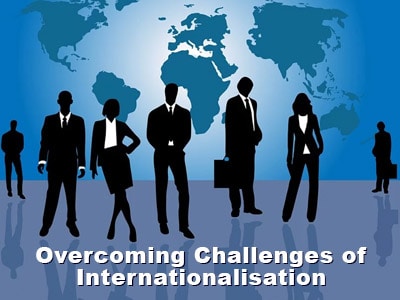Internationalisation is Full of Challenges and at Every Problem There Will Be Opportunities
 Internationalisation – the buzzword trending in the business world. The term itself describes an expansive state of mind. Moreover, most governments in the world are supportive of business entities wanting to head into international waters. However, more and more business find it complicated to head into the global market. Let’s take a look at the everyday challenges of internationalisation.
Internationalisation – the buzzword trending in the business world. The term itself describes an expansive state of mind. Moreover, most governments in the world are supportive of business entities wanting to head into international waters. However, more and more business find it complicated to head into the global market. Let’s take a look at the everyday challenges of internationalisation.
Human Capital
Great brands have made it successful in the global market. Sometimes it is not all about marketing and promotions. At some point, human capital is the better capital for a business to continue flourishing in an international market. Local or regional companies believe it is a case of being noticed abroad, then sending someone to that particular market. Just as fitting the brand to a global audience, the right person will carry the brand appropriately. The right fit may not always put higher-income as their priority. It is the opportunity to work in a different culture or environment that makes it all worthwhile. With that personal enhancement, the person will personify the brand to better suit the situation.
Cultural Differences
One of the challenges of internationalisation is starkly different cultures. With the booming of several markets, people from all over the world are flocking over to the other side. Before setting foot on foreign land, it is better to use the internet to find out what’s the buzz all about. Cultural differences in business terms may not always seem obvious. In some cultures, specific colours are frowned upon, and the use of certain words may mislead the locals. Communications technology today can shorten the period of finding out necessary details about different cultures and how to tread it subtly.
Money Makes the World Go Round
Businesses that require global banking services probably need to work harder. With anti-money laundering on the rise as well as know-your-customer (KYC) tedious requirements, banks tend to focus only on the domestic market. It is unfair, but with international clients queueing up, examining foreign-issued papers is a hassle. This is time-consuming when we live in an almost instant result world. The best bet is that customers’ banks have stable relationships with foreign banks.
Flowing Like a River
Fruitful business is one that continues moving up and down the supply chain. Any stagnancy will cause time wasted, and time equals money spent too. Perhaps this is one of the crucial parts of a business that business owners are not willing to take the risk. There are so many possibilities that could happen along the way, even more so when it enters a new market. With their market, they can identify the what-ifs and overcome them as they are the locals. But, with internationalisation, there is too much to take into account. The further they are from their comfort zone, the higher the chances of things might fall apart. Business owners venturing into the global market can learn mitigating risks from more giant corporations and make baby steps from then onwards.
Taking a Chance From Challenges of Internationalisation
At any point of running a business, there will come a good friend advising to set sail into specific markets. Being the good friend we are, sometimes we foolishly take that advice and pack some of our business partners and dive in. But, now with information available at our fingertips, we can find out about the reality of specific markets. Maybe some products or services will flourish, but not entirely. A look at the political stability of a country or region says a lot about their economic security as well. If a state or jurisdiction is politically shaky, what more is the economy? Even when the politics seem steady and stable, there could be corruption undermining it all. Corruption at any level will end up in overall dissatisfaction. As an exporter, there is also rising concern about payments. Customers, on the other end, are also concerned if their goods will arrive on time in good condition. What exporters can do is that request for longer payment terms from suppliers. As for payments from the end-user, credit insurance can be an option. Taking a chance with internationalisation is a good thing for your business to become a global brand. But, be sure to take calculated risks and then take off into the sunset.








